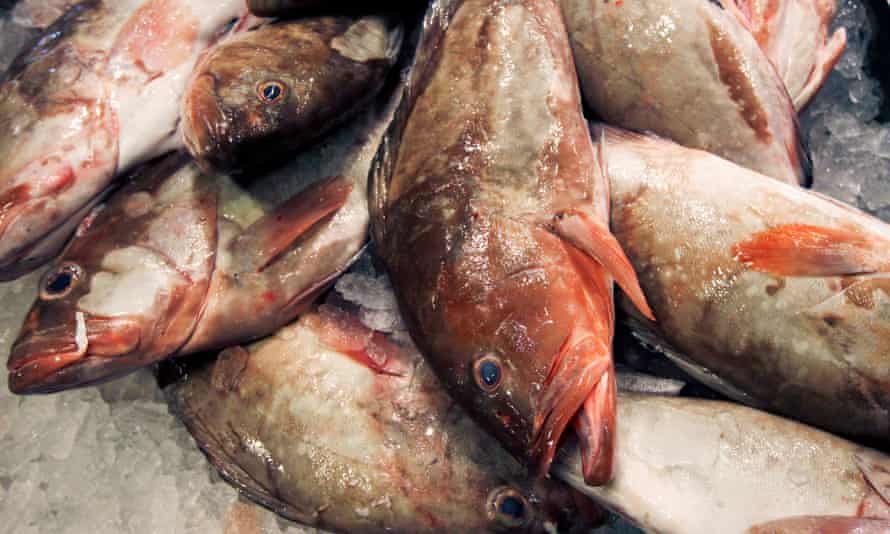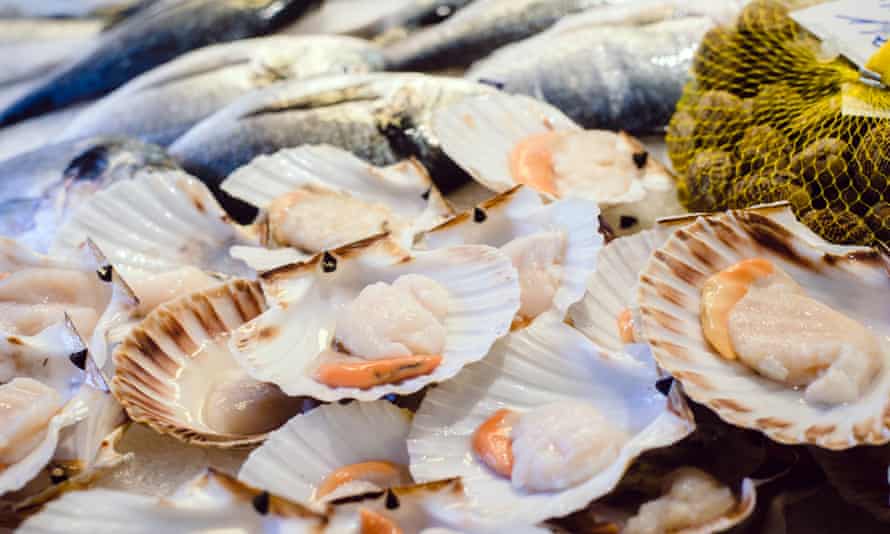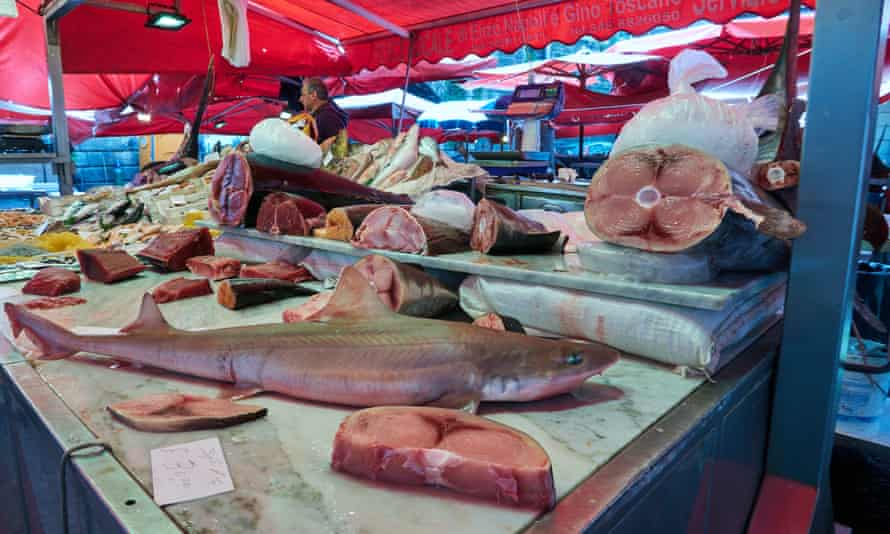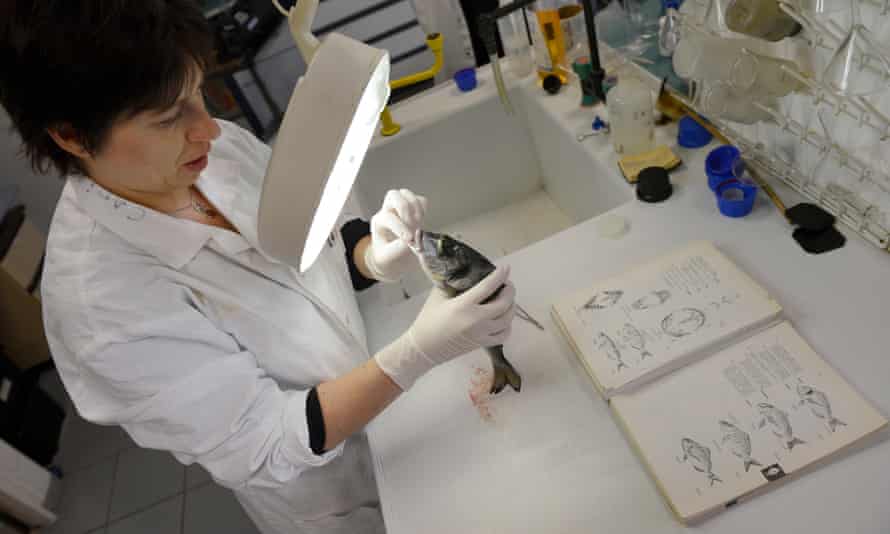Revealed: seafood fraud happening on a vast global scale
"A Guardian Seascape analysis of 44 recent studies of more than 9,000 seafood samples from restaurants, fishmongers and supermarkets in more than 30 countries found that 36% were mislabelled, exposing seafood fraud on a vast global scale.
Many of the studies used relatively new DNA analysis techniques. In one comparison of sales of fish labelled “snapper” by fishmongers, supermarkets and restaurants in Canada, the US, the UK, Singapore, Australia and New Zealand, researchers found mislabelling in about 40% of fish tested. The UK and Canada had the highest rates of mislabelling in that study, at 55%, followed by the US at 38%.
Sometimes the fish were labelled as different species in the same family. In Germany, for example, 48% of tested samples purporting to be king scallopswere in fact the less coveted Japanese scallop. Of 130 shark fillets bought from Italian fish markets and fishmongers, researchers found a 45% mislabelling rate,with cheaper and unpopular species of shark standing in for those most prized by Italian consumers.
Other substitutes were of endangered or vulnerable species. In one 2018 study, nearly 70% of samples from across the UK sold as snapper were a different fish, from an astounding 38 different species, including many reef‐dwelling species that are probably threatened by habitat degradation and overfishing.
Still other samples proved to be not entirely of aquatic species, with prawn balls sold in Singapore frequently found to contain pork and not a trace of prawn.

Fish fraud has long been a known problem worldwide. Because seafood is among the most internationally traded food commodities, often through complex and opaque supply chains, it is highly vulnerable to mislabelling. Much of the global catch is transported from fishing boats to huge transshipment vessels for processing, where mislabelling is relatively easy and profitable to carry out.
There are “so many opportunities along the seafood supply chain” to falsely label low-value fish as high-value species, or farmed fish as wild, says Beth Lowell, deputy vice-president for US campaigns at Oceana, an international organisation focused on oceans. Study after study has found mislabelling is common everywhere, says Lowell.
However, the studies in question sometimes target species known to be problematic, meaning it is inaccurate to conclude that 36% of all global seafood is necessarily mislabelled. The studies also use different methodologies and samples. Nor are fish always deliberately mislabelled – although the huge majority of substitutions involved lower-priced fish replacing higher-priced ones, indicating fraud rather than carelessness.

The problem appears to be rife in restaurants. One study, representing the first large-scale attempt to examine mislabelling in European restaurants, involved more than 100 scientists who secretly collected seafood samples ordered from 180 restaurants across 23 countries. They sent 283 samples, along with the menu description, date, price, restaurant name and address, to a lab. The DNA in each sample was analysed to identify the species, and then compared with the names on the menu. One out of three restaurants had sold mislabelled seafood.
The highest restaurant mislabelling rates – ranging from 40% to 50% – were in Spain, Iceland, Finland and Germany. Fish such as dusky grouper (“mero”) and butterfish were among the species most frequently mislabelled, while for pike perch, sole, bluefin and yellowfin tuna, there was a 50% chance customers did not get what they had ordered.
Sometimes fish are substituted with similar species – one type of tuna for another, for example. Often, however, the replacement is an entirely different species.
A very common stand-in is little known and inexpensive shark catfish, or pangasius. This group of fish is widely farmed in Vietnam and Cambodia, and has a similar taste and texture to other whitefish, such as cod, sole and haddock.

Other substitutions are more unsettling. For example, mixed seafood products such as prawn balls bought in Singapore markets recorded a mislabelling rate of 38.5%. The prawn balls repeatedly contained pig DNA, researchers found.
And in China, 153 roasted fish fillet products from 30 commercial brands bought at local markets were tested to reveal “an alarming misrepresentation rate of at least 58%”, including some substitutions from the deadly pufferfish family.
Substituted fish can pose health risks. One frequent substitute for some varieties of tuna is escolar, a hard-to-digest oilfish. Others have unique parasitesthat may threaten health. Still others are less nutritious: when tilapia is a stand-in for red snapper, people are eating a fish with lower levels of nutrients, including lower omega-3 polyunsaturated fatty acids.
Oceana, which has carried out nearly 20 investigations of its own into mislabelling, also did a global review in 2016 of 200 studies from 55 countries, which found that on average one in five fish sampled from fishmongers, supermarkets and restaurants were mislabelled.
The situation does not appear to be improving. In 2019, Oceana found 47% of the samples it tested from food retailers and restaurants in six Canadian cities were mislabelled.

There is considerable economic incentive to sell low-value fish in place of more popular and expensive species – and even more money to be made “laundering” illegally caught fish, says Rashid Sumaila, a fisheries economist at the Institute for the Oceans and Fisheries at the University of British Columbia.
Sumaila calculated in a 2020 study that between 8m and 14m tonnes of fish are caught illegally every year. “That’s like 15 to 20 million cows being stolen every year,” in terms of weight, he said.
“Fish laundering” is often linked to illegal, unreported and unregulated (IUU) catches by large “distant” fleets, in which foreign-flagged vessels operate off the coasts of Africa, Asia and South America. Often, the catches are processed on board large transshipment vessels, where mislabelling and mixing of legal and illegal fish is done in relative secret. The risk of getting caught is low because monitoring and transparency is weak along the seafood supply chain. “People can make a lot of money doing this,” said Sumaila.
Others lose out. Fish laundering results in an economic loss of $26bn–$50bn (£19bn–£36bn) a year, Sumaila’s study concluded, as illegal or fraudulently labelled fish undercuts the legal industry, making it difficult for honest players to compete. “It’s very corrosive,” he said. “If not stopped, illegal fishing just grows.”
No comments:
Post a Comment